#child abuse tw
Text
In a sick way I find it really funny how toxic estranged parents say "in the old days, people had to stick around and work their issues out!"
Things People Did Back in the Old Days to Escape "Working Things Out" with Their Parents, A Short List:
Murder them!
Marry literally anyone who'd get you away
Fisticuffs
Change your name and pretend to be an orphan
Move out and feud with them for several generations
Join a monastery
Move to the city and get a job in a factory
Buy passage on a boat to some other continent
Convert to a different religion
Join the Navy
ABSOLUTELY ANYTHING
It's incredible, the number of things people would do to get away from shitty parents. Then and now.
725 notes
·
View notes
Text
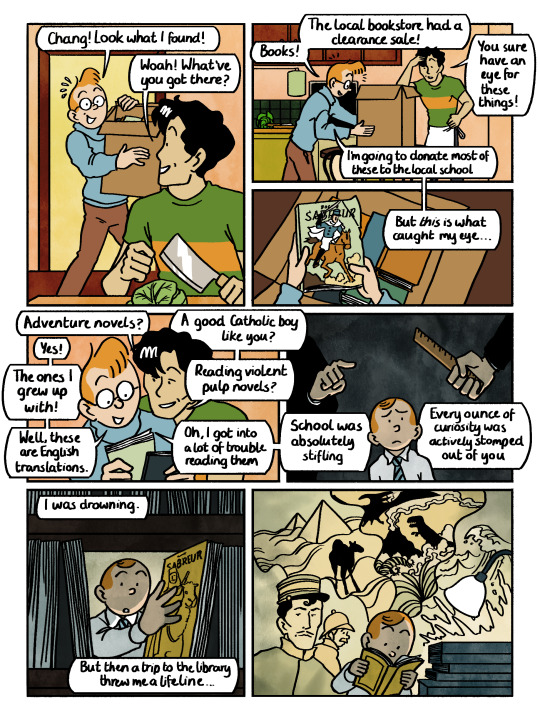
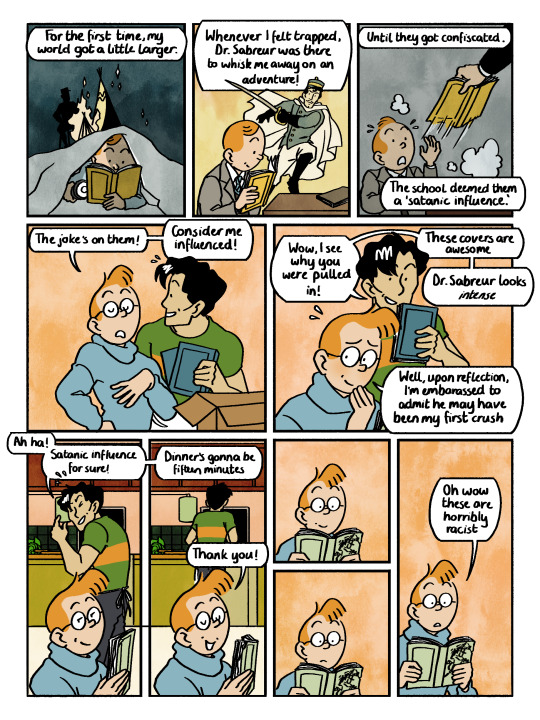
I decided to clean up an old comic of mine! A thirty something year old Tintin reflects on his childhood with Chang.
19K notes
·
View notes
Text





I love pain and agony
part (2/2): prev
#fop#fairly oddparents#fop a new wish#fairly oddparents a new wish#fop dev#fop peri#dev dimmadome#fop nature AU#art#digital art#fanart#comic#ableism tw#child abuse tw#medical trauma tw#I shoulda used actual comic formatting lol but it was too late now LOL#This is both for people who wanna see Dev comfort and also people who dont wanna read my whole fic#also because I think ive been explaining most of Devs feelings in tags and I wanted to actually show them off somewhere
2K notes
·
View notes
Text
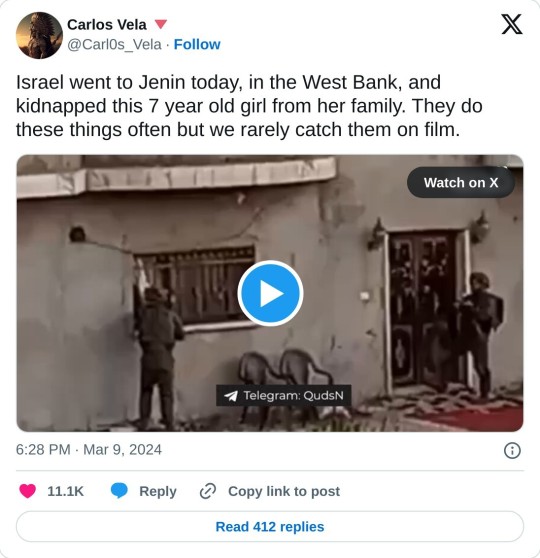
Palestinian children in the Israel military detention system face physical and emotional abuse, with four out of five (86%) of them being beaten, and 69% strip-searched, according to new research by Save the Children. Nearly half (42%) are injured at the point of arrest, including gunshot wounds and broken bones. Some report violence of a sexual nature and some are transferred to court or between detention centres in small cages, the child rights organisation said.
#yemen#jerusalem#tel aviv#current events#palestine#free palestine#gaza#free gaza#news on gaza#palestine news#news update#war news#war on gaza#children of palestine#jenin#palestinian hostages#west bank#free west bank#Child abuse tw#torture tw
2K notes
·
View notes
Text
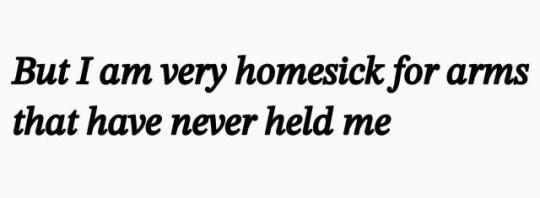


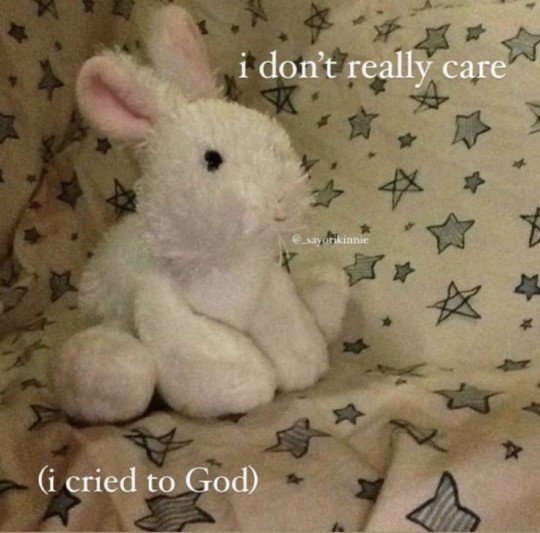
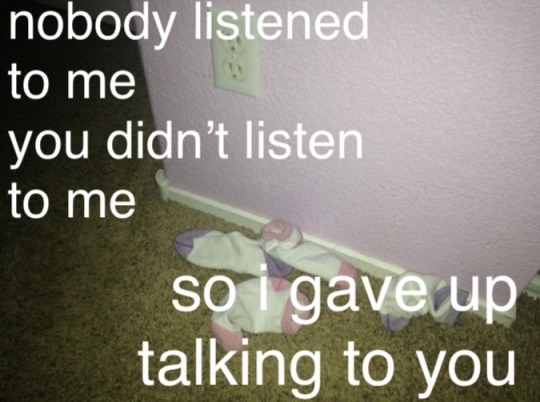
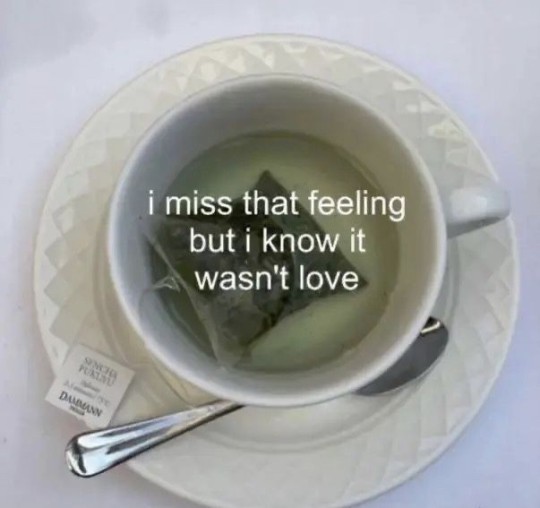
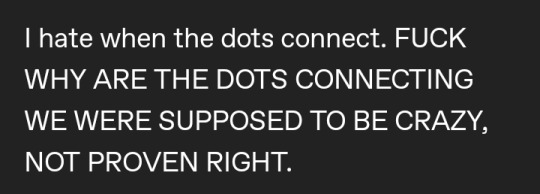


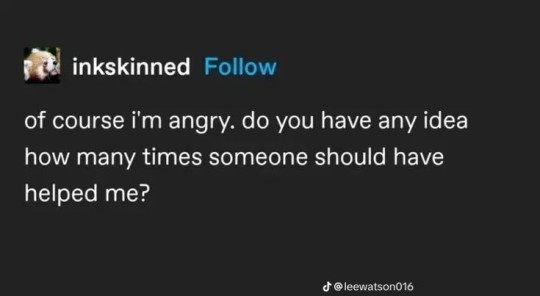
I didn't realize your reasons and I didn't know your plans, until I became the same age you were back then and it horrifies me. I wish you had done more so I could prove the world I am right, and I wish you had done nothing to me at all. Isn't it weird how it works?
#web weaving#web weave#webweaving#on grief#childhood grief#trauma tw#child abuse tw#maybe(?)#grooming tw#abuse tw#its so funny how i was punished for being naive and he wasnt punished for being a fucking creep
2K notes
·
View notes
Text
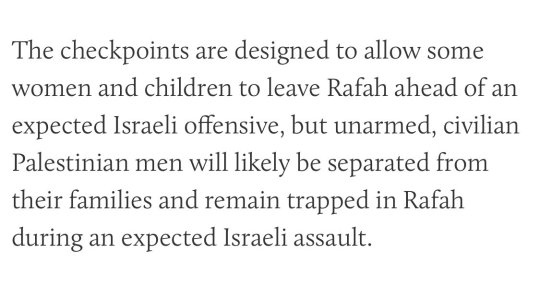
Scarier when you realise the IDF tend to consider any Palestinian male over the age of 10 a “man.”
#Rafah#politics#free palestine#israel#democrats#republicans#horror#isreal#palestine#child abuse tw#usaotus#bibi netanyahu
1K notes
·
View notes
Text
some misc thoughts on child abuse and adultism/ageism:
in House M.D 2x16, the patient is a disabled teenage girl, melinda. she's had multiple life-threatening allergic reactions, the last of which led to a car accident which resulted in her needing a heart transplant. her mother is shown to be extremely protective of her (not allowing her to attend public school, not letting her go outside, restricting who can visit her) and this is a major issue in her and her daughter's relationship.
about halfway through the episode, melinda goes missing from her room. one member of houses' team, foreman, realizes she is trying to get outside and went to the roof. he finds her sitting in the stairwell, distressed. melinda reveals that her mother was always extremely controlling over her- the point of not allowing her to do seemingly any after-school activities- long before she got sick, and that her daughter's heart transplant "gave her what she always wanted." foreman responds by saying that, because of her current illness, it's "an insane time to criticize your mom for being overprotective."
melinda expresses that her mother's abusive behavior has now been retroactively justified by her disability; she is seen as "insane" for being distressed by what is clearly a life of restricted autonomy. the scene ends with a line that has stuck with me since seeing it: melinda looks up at the stairwell and says softly, "i didn't even try to get outside. i was too scared."
the actual plot of the episode isn't the point. the point is that we tend to view "children abused by foreign adults" and "children abused by their parents" as two separate categories with opposing needs. children being taken advantage of by strangers should have been monitored and restricted. like the mother in the episode, the parent assumes that being more protective = the child being more safe. the correct way to handle child abuse is parental vigilance. sure, maybe this behavior encourages some abusive parents (who are probably the minority anyways, because I would never abuse my child!), but that's just the price we pay for making sure the other children are safe?
what i think this episode shows- accidentally, seeing how they never actually take melinda's abuse seriously- is how you can be fucked over twice. a child who is being abused by someone online can also be abused by their parent- are probably even more likely to experience that because of an abusive home. and then, if that outside abuse is realized by the parent, it retroactively justifies their behavior. it proves not just to them but the adult world that controlling behavior is rational and helpful- clearly, the abuse was caused because they didn't control enough.
and in both the episode and this hypothetical, the parent's reaction- while it may include genuine feelings of love- also comes across as being more distressed over the violation of one's possession than being distressed on another person's behalf. the child is an extension of you, and thus any desires it has that conflicts against your own are like an autoimmune disease. something to be shut down as fast as possible. vulnerable children, abused children, the "sympathy" given to them is a double-edged sword because as soon as you aren't the quiet, docile creature who agrees with whatever the adults say, you are crazy and ungrateful and "don't you realize we just want what's best? look at what happened to you!"
704 notes
·
View notes
Text
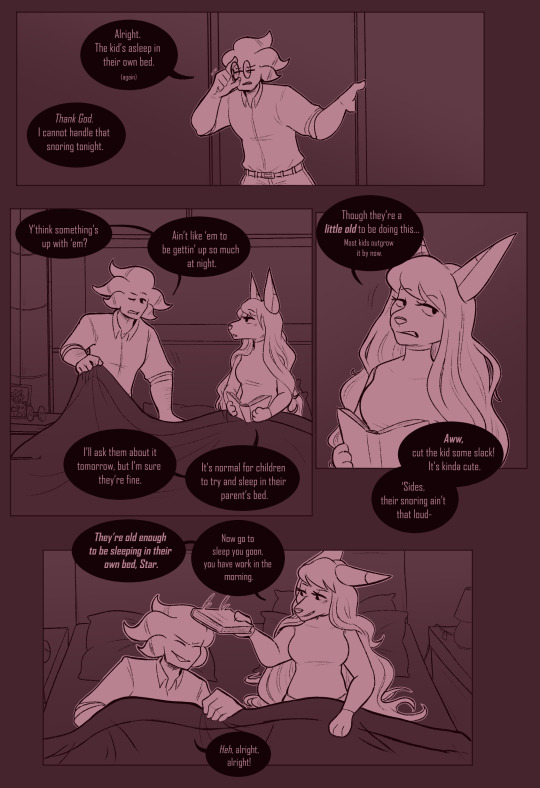
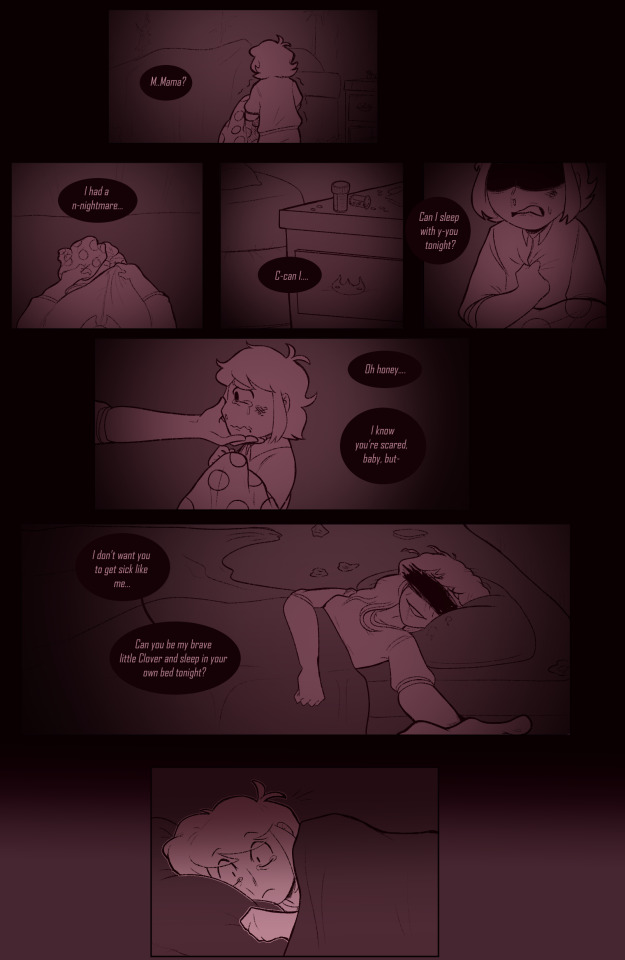
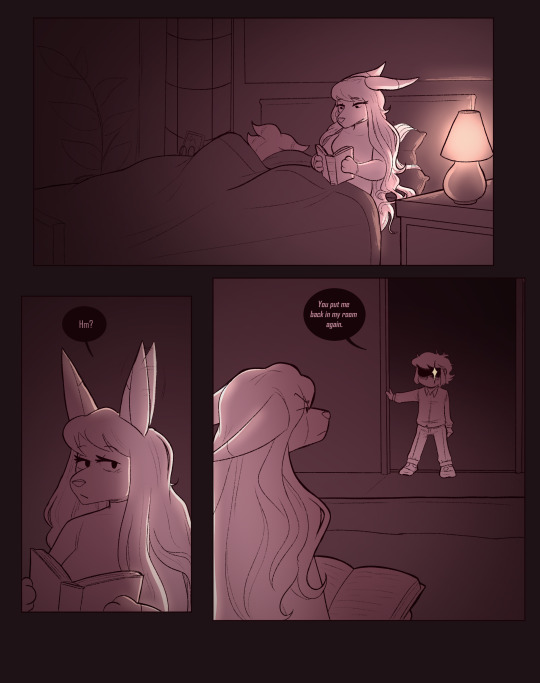
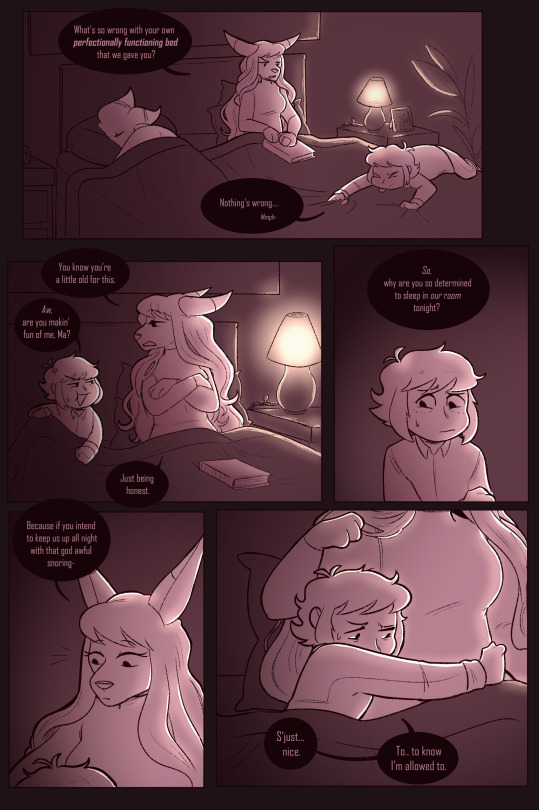
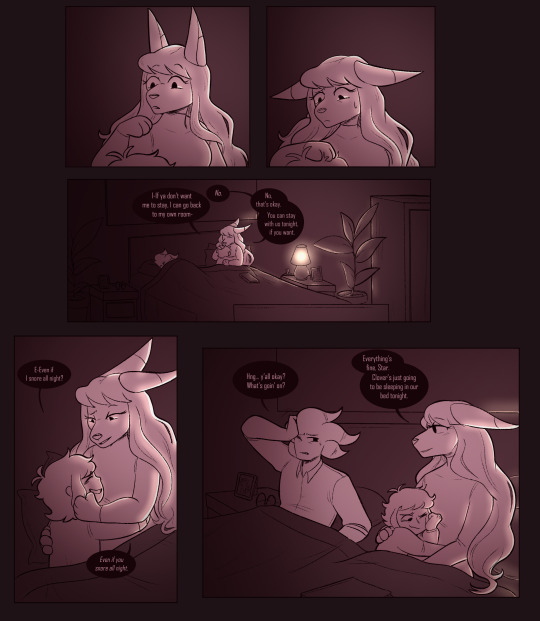
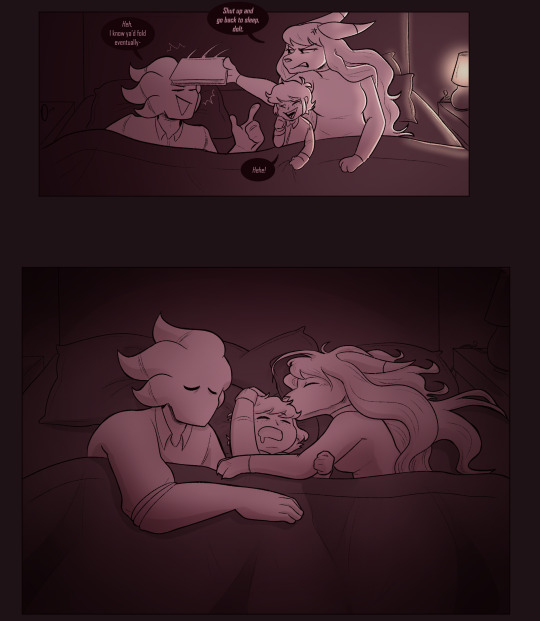
Justice Family Cuddles ˗ˏˋ ★ ˎˊ˗
#undertale yellow#uty#uty au#lucky clover au#starlo uty#ceroba uty#clover uty#ceroba ketsukane#north star uty#staroba#starlo x ceroba#comic#undertale yellow fanart#the cowboy hat draws#Was originally meant to upload this on Mother's Day but life took a hard nosedive so. Here it is#I'm not super fond of it but I haven't done comics in years so. Baby steps!#child abuse tw#abuse tw#illness tw#Let me know if there's other tags I should put here to cover all my bases#And again for the people in the back. No weird tags on this please. This is a child with their adopted parents
943 notes
·
View notes
Text




Do you want to hear my story?
#armand#armand iwtv#assad zaman#louis de pointe du lac#daniel molloy#eric bogosian#jacob anderson#interview with the vampire#iwtv#no matter what armand did/say#I think this was a line neither of them should have ever crossed#not gonna be surprised if armand doesn't mention what they did to him ever again#sa tw#child abuse tw#and louis has an excuse#daniel not so much#like I love him but... no#don't be like those redditors that said armand was lying about what marius did to him#myiwtvedit
708 notes
·
View notes
Note
How do Canadian schools teach about indigenous Canadian history and culture? -a curious USAmerican
In my experience we learned about colonization at the same time as we learned about the formation of Canada. At first it was "European settlers came and pushed out the indigenous population", then in the higher grades we learned more about the how and the why.
For example, how carts full of men with rifles would ride around shooting Buffalo, then leaving the meat on the ground to rot, because "a dead Buffalo is a dead indian", which was so fanatical it almost wiped out wild Buffalo entirely
Also how Canadian settlers were lured in with beautiful hand-painted advertisements for cheap, beautiful, fertile land that was unpopulated and perfect, if only you'd sail over with your entire family and a pocket full of seeds- only to be met with scared, confused, and angry lawful inhabitants already run out of ten other places, and frigid winters, and rocky, forested, undeveloped dirt.
also, smallpox blankets, where "gifts" of blankets infected with smallpox were intentionally given out
And treaty violations- Either ignoring written agreements entirely, or buying them out at insanely low prices and lying about the value, or trading for farming equipment that they couldn't use because they weren't farmers.
Then in the first world war, where they told indigenous peoples here that they'd be granted Canadian citizenship if they enlisted
To Residential schools, which was straight up stealing kids for slavery, indoctrination, and medical experiments
But we also covered the building of the Canadian Railway in which Chinese immigrants were lowered into ravines with dynamite to blow out paths through the mountain for pennies on the dollar
And the Alberta Sterilization Act, where it was lawful and routine procedure to sterilize women of colour and neurodivergent people without their awareness or consent after giving birth or undergoing unrelated surgeries
But I'm rambling.
We kind of learned Aboriginal history at the same time as everything else? Like. This is when Canada was made, and this is how it was done. Now we'll read a book about someone who lived through it, and we'll write a book report. And now a documentary, and now a paper about the documentary. Onto the next unit.
And starting I think in grade 10 our English track was split between English and Aboriginals English, where you could choose to do the standard curriculum or do the same basic knowledge stuff with a focus on Aboriginal perspectives and literature. (I did that one, we read Three Day's Road and Diary Of A Part-Time Indian, and a few other titles I don't remember.)
There was also a lunch room for the Aboriginal Culture Studies where Aboriginal kids could hang out at lunch time if they wanted, full of art and projects and stuff. They'd play music or videos sometimes, that was cool
And one elective I took (not mandatory cirriculum) was a Kwakiutl course for basic Kwakwakaʼwakw language. Greetings, counting to a hundred, learning the modified alphabet, animals, etc. Still comes in handy sometimes at large gatherings cause they usually start with a land recognition thanking whoever's land we're on, with a few thanks and welcomes in their language.
And like- when I was in the US it was so weird, cause here we have Totem poles and longhouses and murals all over and yall... don't? Like there is a very distinct lack of Aboriginal art in your public spaces, at least in the areas I've been
My ex-stepfather, who was American, brought his son out once, and he was so excited to "see real indians" and was legitimately shocked to learn that there weren't many teepees to be found on the northwest coast, and was even *more* shocked when we told him that you have Aboriginal people back home too, bud. Your Aboriginal people are also named "Mike" snd "Vicky" and work as assistant manager at best buy.
If you'd ask me, I'd say that the primary difference is that USAmerica (from what I've seen, and ALSO in entirely too much of Canada) treats our European and Aboriginal conflicts as history, something that's tragic but over, like the extinction of the mammoths, instead of like. An ongoing thing involving people who are alive and numerous and right fucking here
But at the end of the day, I'm white, and there are plenty of actual Aboriginal people who are speaking out and saying much more meaningful things than I can
So I'm just gonna pass on a quote from my Stepmum, who's Cree, that's stuck with me since she said it:
"You see how they treat Mexicans in America? That's how they treat us here. Indians are the Mexicans of Canada."
#Canadian history#Canadian education#Medical tw#Medical malpractice#Human rights#Genocide tw#Residential school tw#Child abuse tw#Slavery tw#Current events#Canadian Education#Aboriginal history
540 notes
·
View notes
Text
not a dream
can someone Dutch explain to me or translate how much outrage there is in Netherlands about convicted criminal Steven van de Velde being allowed to represent you in the Olympics because it's been awfully quiet and I don't know if people are just not translating it or what
I've seen people on social media say that Dutch people don't care and I refuse to believe that
he was convicted for child r*pe btw
he was 19 and she was 12, he groomed her online and traveled to her hometown in England, gave her alcohol and r*ped her
#not a dream#child abuse tw#sa tw#child sa tw#csa tw#netherlands#dutch#steven van de velde#olympics#abuse tw
741 notes
·
View notes
Text
Currently getting my socks clean blown off by Rethinking Narcissism, by Dr. Craig Malkin. Which I found, in a roundabout way, from this video on Midsommar, grief, and narcissism.
Tonight I woke up from a nap and accidentally took my morning meds, so I'm going to be up for a few hours because of the meth. In place of sleep, I'll try to roughly sum up some basic ideas proposed by the research the book is based on:
That traits of "narcissism" like entitlement, grandiosity, and feeling special are not inherently toxic. There are times and places they are appropriate and beneficial. If you show up at a hospital with a gunshot wound to the chest, you should not sit and wait to be seen after people with earaches and coughs.
(Actually, medical systems are designed to prioritize people with more urgent needs, and you qualify under that system. You are special and are deserving of different treatment than those others, which is why making your needs known, even insisting on it if you're not listened to appropriately the first time, is an extremely good idea. It keeps you from bleeding to death on the floor, and keeps the hospital from getting its pants sued off by your heirs.)
It is more useful to view "narcissism" not as an inherent immutable personality trait, but as a cluster of coping mechanisms. As previously stated, there are times they are exactly the right coping mechanism for the job. However, people we call "narcissists" tend to cling to these ones even when they become detrimental to themselves and others, often because they lack other ways of regulating their emotions and getting their needs met.
And that is something they can change, if a person is willing to put in sincere and difficult work. It is not usually fast change; it's a matter of years, not weeks. But a skillbuilding approach turned Borderline Personality Disorder from an immutable curse to a fully treatable (though not quickly treatable) condition, and there's a lot of hope that it can do the same for Narcissistic Personality Disorder.
Meanwhile, there's an opposite end to the narcissism spectrum, and it is also pathological and destructive to hang out there all the time. It's an aversion, or even a resistance, to expecting yourself or other people to treat your own feelings, thoughts, ideas, needs, or preferences as important. For Greek mythology reasons, its proposed name is Echoism.
Unfortunately, because most of the damage echoism does is, by its very nature, localized to its sufferer and their own personal relationships, its downsides aren't often talked about. In fact, it's often seen as an ideal moral state, a kind of altruism or saintliness everyone should strive for. As a pathological coping mechanism a person is trapped in, though, it's often more a fear-based reflex than a conscious and deliberate attempt to achieve some real and specific good. It's not actually as beneficial as being able to recognize your needs, desires, positive aspects, and areas of competence or excellence, and bring them forward in your relationships with other people and yourself.
To me this has all been a cross between a gut-punch and a cool, sweet drink of water. There have been other ways to describe echoism over the years, but this feels like the most concise and useful one I've seen in ages.
It specifically puts its pin down in the middle of the moral debate a lot of people struggle with—"What right do I have to put myself forward? What hope do I have of being seen and accepted? Isn't it better not to burden anybody else?"—and says that the problem is not feeling in touch with either side of the equation, but specifically, the inability to move from one part of the spectrum to another when it's merited by circumstances.
When I was a child, I thought Echoism was the answer. It was my ideal. I thought it was what would get me the love and acceptance I wanted, and would keep me safe from the pain of rejection or not being understood. I had no idea it would actually, in fact, be the primary cause of alienation and loneliness for the rest of my life.
Now I'm so deeply thankful I couldn't fully achieve it, in practical terms. As hard as I tried to erase myself, there were always things I loved too much to suppress. I still found ways to express and discover myself in the books I read, the stories I wrote, the intellectual work of school and the experience of pursuing hobbies I loved, my ambitions to be helpful even when they demanded I stop being selfless, and the relationships where I felt safe enough to experience love and acceptance even if I didn't think I deserved them.
There's this question I found a while back that echoed in my bones: Who am I allowed to be around you? Because that's what I felt like, as a child. If I wanted to engage with other people and minimize my risk of harm, it was my job to bend into a pretzel and fit the shape they wanted. And thank god, thank god, thank god, I couldn't fully do it. Despite everything, there were parts of me too strong and bright to lop off completely to get my arms and legs inside the carriage. I was able to take care of myself and let them grow in secret until I found social places I could let them out again. Despite myself, I found ways to grow and thrive, well beyond the trauma that said I shouldn't have.
1K notes
·
View notes
Text
Ok since it didn't stop annoying me after i first saw it. You know that post going round thats like "i don't know why people still hit children when we know that making them wear a silly hat makes them ashamed"? It pisses me off because why are we still insisting on punishing kids? You learned hitting kids hurts them (no duh) and your first instinct is to turn to humiliation and shame instead? On god? You people won't even punish dogs and cats. If someone punished their wife you'd lose your shit
Also way to go recreating the dunce cap, which I thought we all agreed was child abuse, but I guess it was actually abandoned as a classroom staple cause it went out of fashion or something. Not because making children learn to dread wearing a humiliating hat was harming their self esteem and their relationship with figures of authority or anything. 2024 dunce cap revival for naughty children let's go
531 notes
·
View notes
Text



SUNNYCOTTON!!!!! a win for the lesbians <3
i'm trying to implement more traditions and culture for Fallenclan, so behold!! giving someone a cool bug as an old-fashioned way of asking to be mates :D
First
Prev
Next
#the bug is supposed to be a cottonwood leaf beetle. btw <3#blood tw#child abuse tw#clangen#clan generator#art#fallenart#safari#snowpaw#patchback#cottonleaf#sunnytuft#imagining sagespeckle going like 'listen. sooner or later sunnytuft is going to give you a bug ok. it means shes in gay love with you.'#'trust me on this'
376 notes
·
View notes
Text
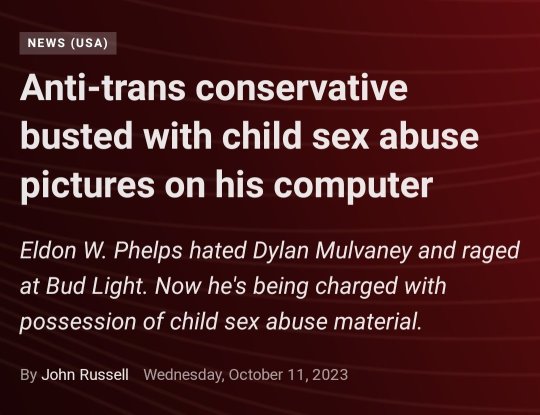
#dylan mulvaney#politics#transgender#abuse tw#child abuse tw#democrats#republicans#bud light#instagram
2K notes
·
View notes
Text
I think it’s so interesting that Kui decided to show us how differences in lifespan affect tallmen and elf relationships from both angles with Kabru and Thistle and also how that reflects real-life abusive situations. And then goes on to deconstruct that by showing how genuine understanding and respect CAN exist between the races with other characters!
Kabru being raised by an elf (who is shown to only have a superficial respect for short-lived races, the same one might have for a pet in a lot of ways) and treated like a child even though he’s in his 20s. After all, a 20 year old elf would be a kindergartener, and Milsiril seems to have a rather toxic combination of overprotectiveness and dehumanizing tendencies that leads to perpetually seeing the children she raises as children, even well into adulthood for their race.
And yet, we see with characters like Otta that this doesn’t have to be true of EVERY elf (nor should it logically be, especially those who spend actual time around short-lived races.) For all the jokes made at her expense I actually think it’s really interesting that she’s also canonically queer since recognizing the agency and maturity of short-lived races is in itself a type of queerness in elf society from what we’ve seen. Senshi too, as funny as his misconstruing Chilchuck as a child is I think it’s really important that he realizes his mistake and rethinks his assumptions on short-lived races following his example. It doesn’t HAVE to be the way it is, but it will take work on each side to improve things.
Then on Thistle’s end… woof. Complete opposite of Kabru, it was difficult for the tallmen of the golden kingdom to comprehend how someone in their, like, 60s could still behave like a teenager and chalked that up to a personal and moral failing rather than literal differences in biology (kind of an autistic mood but that’s a conversation for later.) It’s just as disturbing as Milsiril’s treatment of the children she adopts really, since they explicitly didn’t want an adult that could exert their own agency and control over their situation. And the thing is it’s not like that’s totally uncalled for, the previous points show how a non-insignificant number of members of long-lived races do genuinely see short-lived races as inferior, or are otherwise ignorant, like with below.
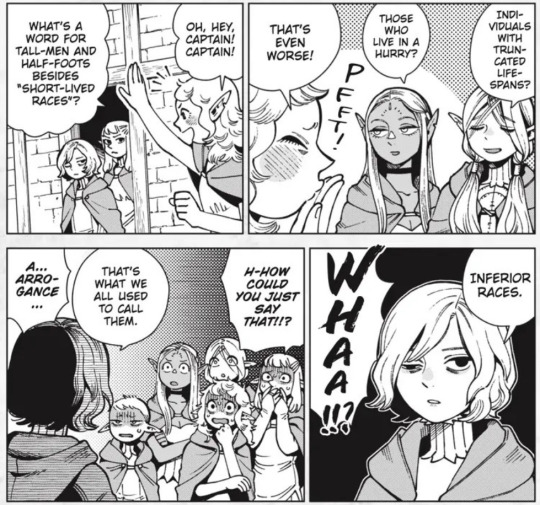
It ended up working out just how they wanted, because Thistle’s child-like innocence and singleminded desire to make the only family he had happy meant he was never going to do anything he didn’t think would help them… which then backfired, because of course it would. It’s overcontrolling and manipulative parenting, but with the added spice of lifespan differences and magic. Kabru ended up detesting the elves that raised him and wanting nothing to do with them, and Thistle basically had a massive breakdown trying too hard to please everyone. Infantilization vs adultification, as some have said, with predictable results.
#polly speaks#dungeon meshi#dungeon meshi spoilers#dunmeshi#delicious in dungeon#kabru of utaya#thistle dungeon meshi#child abuse tw#to be safe#ask to tag#sorry for the milsiril hate I’m willing to hear perspectives but everything about her icks me out#dungeon meta
416 notes
·
View notes